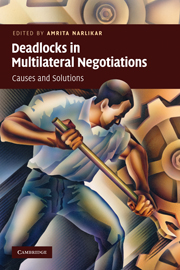Book contents
- Frontmatter
- Contents
- List of figures
- List of tables
- Notes on contributors
- Acknowledgements
- Introduction
- Part I Disciplinary insights
- Part II Case studies
- 5 Transatlantic intransigence in the Doha Round: domestic politics and the difficulty of compromise
- 6 Know the enemy: uncertainty and deadlock in the WTO
- 7 Entering the zone of agreement: the United States in climate change negotiations
- 8 The role of informal negotiation processes in breaking deadlocks: the UN Security Council
- 9 Negotiating international policies on Kosovo
- 10 Beyond negotiation deadlocks: the importance of mediation and leadership change
- Conclusion: case studies as evidence: lessons learned
- Bibliography
- Index
6 - Know the enemy: uncertainty and deadlock in the WTO
Published online by Cambridge University Press: 05 June 2012
- Frontmatter
- Contents
- List of figures
- List of tables
- Notes on contributors
- Acknowledgements
- Introduction
- Part I Disciplinary insights
- Part II Case studies
- 5 Transatlantic intransigence in the Doha Round: domestic politics and the difficulty of compromise
- 6 Know the enemy: uncertainty and deadlock in the WTO
- 7 Entering the zone of agreement: the United States in climate change negotiations
- 8 The role of informal negotiation processes in breaking deadlocks: the UN Security Council
- 9 Negotiating international policies on Kosovo
- 10 Beyond negotiation deadlocks: the importance of mediation and leadership change
- Conclusion: case studies as evidence: lessons learned
- Bibliography
- Index
Summary
Know the Enemy and know yourself; in a hundred battles you will never be in peril.
Sun Tzu, Section III: 31–3, p. 84Deadlocks have plagued the Doha Development Agenda (DDA). The round was launched in November 2001, but negotiations got deadlocked at the Cancun Ministerial Conference in 2003. Despite being scheduled for completion by 1 January 2005, it continued to run into missed deadlines. In July 2006, Director General of the WTO, Pascal Lamy, called for an indefinite suspension of the negotiations, and admitted, ‘There's no beating around the bush. We're in dire straits’. It took over six months for negotiators to resume the full-fledged negotiation process in February 2007, which collapsed once again in the July talks of 2008. Even at the time of writing this chapter, a completion of the Round remains elusive.
This outcome – of extended non-agreement, or deadlock taking the form of an extended delay – presents a puzzle for two reasons. First, both developed and developing countries can potentially benefit from the Doha Round, and there, thus, exists a positive zone of agreement. A World Bank study estimates, for instance, that global gains would be in the range of $95–120 billion per year through an agreement based on the Hong Kong Ministerial Declaration. Second, in contrast to the 1960s–1970s when confrontations between the North and South were rooted in deep ideological differences and divergent visions of development, most developing countries today have begun to recognise the benefits of controlled trade liberalization.
- Type
- Chapter
- Information
- Deadlocks in Multilateral NegotiationsCauses and Solutions, pp. 142 - 163Publisher: Cambridge University PressPrint publication year: 2010
- 11
- Cited by



